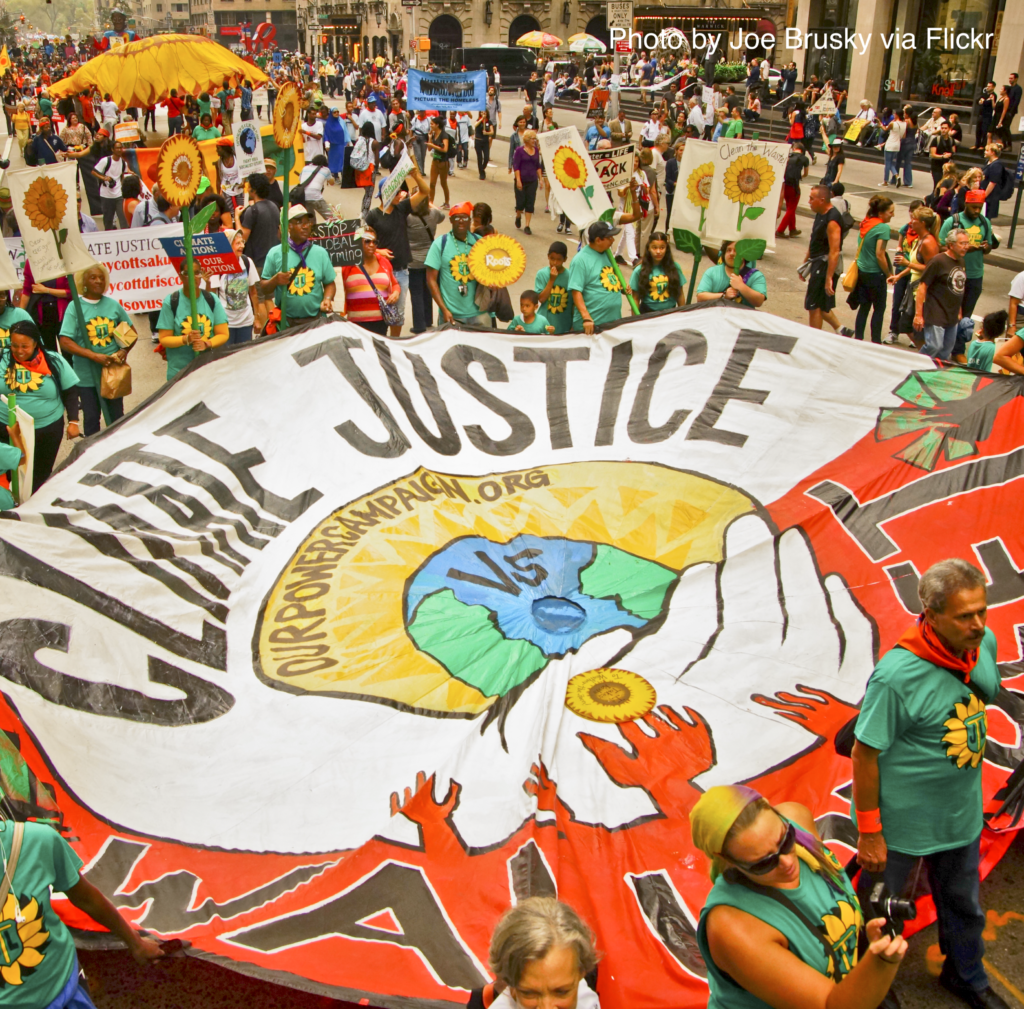Across the planet, people are increasingly feeling the impacts of climate change on their enjoyment of human rights. From loss of human life brought about by climate-related disasters, to threats to food security and access to clean water, no country is immune.
The urgency of action to address climate change — and the scale of action required — also creates an additional risk: that responses to climate change could disregard human rights standards and infringe on the rights of communities and indigenous peoples.
Human Rights and Climate Action
The scientific community has stressed that climate action is more effective if it reinforces human rights, women’s empowerment, public participation, and full respect for the rights and knowledge of indigenous peoples. And in the Paris Agreement, all governments formally recognized the importance of placing human rights at the core of their climate policies. The opening paragraphs of the Paris Agreement reaffirm that States must respect, protect, and consider their human rights obligations when taking climate action.
But the challenge is for countries to protect human rights in all aspects of their climate policies, like designing energy and land management policies. Therefore, it’s crucial that States assess how all of their policy choices impact human rights and ensure that all voices in society are heard in the policy making process, including the voices of the most marginalized or disenfranchised.
A Growing Concern of Human Rights Treaty Bodies
In this context, human rights institutions have a critical role to play.
Some human rights institutions are already taking this role seriously, such as the treaty bodies of the United Nations. Established under key UN human rights treaties, the human rights treaty bodies monitor how countries are implementing the human rights protected under those treaties. And a key role that these bodies have been increasingly playing is spelling out how countries’ existing human rights obligations apply to climate change.
In fact, in 2018, the human rights treaty bodies made an unprecedented number of recommendations to States concerning their legal obligations to protect people from the adverse impacts of climate change. We describe these developments in our 2019 Synthesis Note, published last week by the Center for International Environmental Law and the Global Initiative for Economic, Social and Cultural Rights.
On a global level, the treaty bodies have published authoritative general guidance on how States must implement their human rights obligations in the context of climate change.
When reviewing countries’ implementation of their human rights obligations, these institutions have also made a number of recommendations to specific countries on some of the most salient domestic issues related to climate change. The Committee on Economic, Social, and Cultural Rights (CESCR), Committee on the Elimination of Discrimination Against Women (CEDAW), and Committee on the Rights of Children (CRC) have been particularly active in spelling out what these obligations mean in the context of countries’ mitigation and adaptation policies.
For example, in October, the CESCR warned Argentina that its planned development of the Vaca Muerta shale formation may be violating or threatening to violate human rights. Importantly, just last month, the CEDAW recommended that the United Kingdom consider a complete ban on fracking.
These Committees have recommended that States reduce their emissions in line with international commitments (including through time-bound benchmarks), review their energy policies to ensure they align with human rights obligations, and consider both the domestic and extra-territorial human rights implications of the extraction and consumption of fossil fuels. They have also repeatedly highlighted a broader range of obligations going beyond those defined under climate agreements. For instance, they have stressed that States bear responsibility for emissions to which they contribute through exports and investments, even if those emissions are generated beyond their own borders.
And in protecting communities from the impacts of climate change, the human rights treaty bodies have emphasized the importance of preventive measures to anticipate adverse impacts on human rights caused by climate-related disasters. They have also insisted on the legal obligation of States to ensure the full and effective participation of women in all climate-related decision making and to place the rights of women and of children at the core of adaptation measures.
A Key Tool for Advocates to Strengthen Human Rights and Climate Action
For climate advocates around the planet, the statements emerging from these UN independent expert bodies have two main implications.
First, they provide authoritative guidance on how to interpret the existing human rights legal obligations of States in the context of climate change. These statements can be used to support advocacy targeting national governments or private actors. They can also support the legal claims made in climate litigation at the national level.
Second, they signal an opportunity for civil society groups to engage with these Committees: Our 2019 Synthesis Note includes a summary of countries coming up for review in 2019 by the three most active Committees (CESCR, CRC, and CEDAW). Civil society can get involved by submitting information on climate-related human rights harms for the countries under review, to draw Committees’ attention to these important issues.
The human rights treaty bodies’ growing body of work on climate change is a welcome development that deserves greater attention. Their recommendations have significant potential to support and strengthen climate advocacy, litigation, and campaigns, and climate advocates should consider opportunities to engage with these bodies and influence their outputs.
***
Want to keep up-to-date?
Sign up for updates. As UN human rights treaty bodies increasingly engage on issues related to the human rights implications of climate change and climate action, including by making recommendations to States on how to interpret their human rights legal obligations in the context of climate change, we will provide periodic updates (4-6 updates annually) to keep you abreast of the latest relevant developments.
By Sébastien Duyck, Center for International Environmental Law, and Lucy Mckernan, Global Initiative for Economic, Social and Cultural Rights
Originally posted on April 4, 2019

